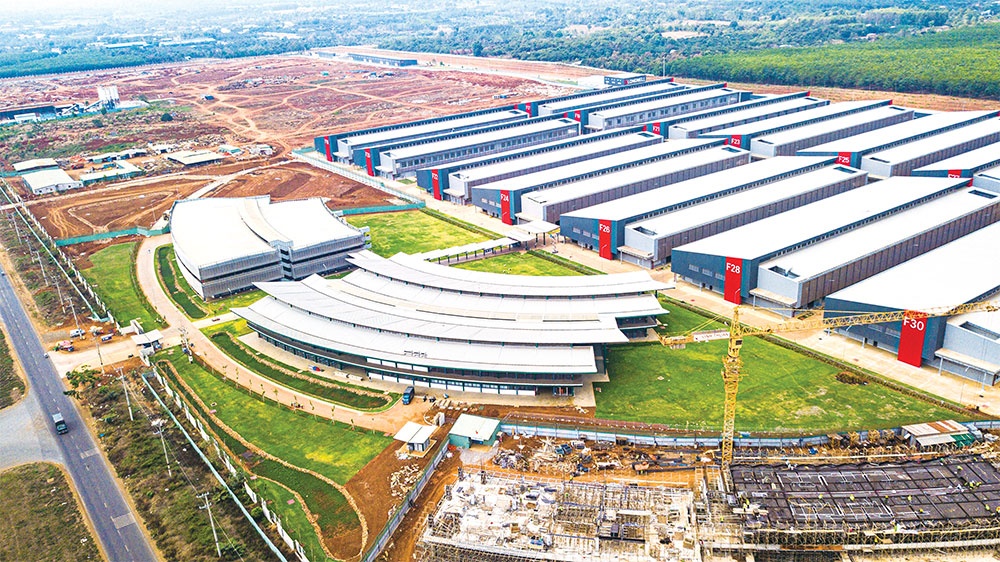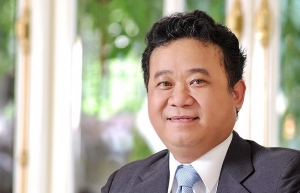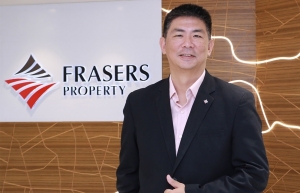Industrial land supply a fillip for investors
In early July, Amata Long Thanh Urban JSC started construction of its Long Thanh high-tech park in the southern province of Dong Nai, with a total investment of $282 million.
The facility covers 410 hectares, aiming to entice modern manufacturing industries, and is expected to create additional tech-based value while contributing to the socioeconomic development of local communities.
 |
| Industrial land supply a fillip for investors - illustration photo |
The total infrastructure investment in the first phase stands at around $39.8 million, and is divided into two phases to be completed in October and the second quarter of 2024.
Meanwhile, Suntory Pepsico Vietnam Beverage in July announced its latest factory in Huu Thanh IDICO Industrial Zone, with a total capital amount of $185 million. Located in the southern province of Long An, it will be put into operation by 2026. The 20ha plant in Huu Thanh Industrial Park (IP) will have an annual output of 796 million litres of products, including purified water, milk, and other beverages.
Huu Thanh IP, invested by IDICO Corporation, which has attracted 35 investors with many notable names such as Suntory Pepsico, FPT Retail, Cuu Long Pharmaceutical, and Messer Industrial Gas, with occupancy as of June at about 26 per cent.
Nguyen Dinh Nam, founder and general director of Vietnam Investment Cooperation and Promotion JSC, said that compared to other countries in Southeast Asia, Vietnam currently had the advantage of geographical location and low input costs.
However, in the next 3-5 years, the trend of rapidly increasing labour and land prices will make these advantages gradually lose their competitiveness, so focusing on developing supporting industries and supply chains is a vital way for further development.
“Investors are currently utilising these advantages to optimise profits, but new IPs need to focus on investment in transport infrastructure and supply chain connectivity to increase investment efficiency,” Nam said.
The amount of foreign capital flowing is causing the demand for IPs to increase.
As of mid-July, the total newly registered capital, adjusted and contributed capital to buy shares and buy capital from foreign investors reached around $16.24 billion, according to the Ministry of Planning and Investment. Of those, around 1,630 new projects were granted approval with the total registered capital reaching nearly $7.94 billion, increasing 75 per cent in terms of investment and 39 per cent in capital over the same period last year.
Vietnamese IPs are still attractive addresses for foreign investors when coming to Vietnam. According to a report on the industrial real estate market in the southern key economic region released by Cushman & Wakefield in June, the demand for related rental is continuing to increase, despite some economic difficulties.
“Despite the slowdown in global economic growth, the market still recorded a lot of demand for IP land in the south, with a net absorption of more than 70ha, new projects, and capital increases. These deals have helped keep occupancy rates stable at just over 80 per cent,” read the report.
The report also released that no new IP supply may be recorded in the second half of 2023, but 2024 will welcome about 1,800ha of new industrial land area, concentrated in Binh Duong, Dong Nai, and Long An provinces.
“The future supply of industrial land will increase significantly, with an estimated 5,250ha in 2026, after local authorities complete the adjustment of the master plan and development orientation of the provinces,” it said.
| Fion Ng - Chief operation officer BW Industrial Development JSC
With the global recessionary outlook, export orders in Vietnam have dropped. But many companies who are talking to us right now are actually thinking about catching the economic rebound in the second half of 2024. To be ready for that, they have to start looking now. Our customers are looking for space because supply chain diversification has become a top priority, and they are preparing ahead for the economic rebound expected strongly in 2024. The plan has strong financial backing from international investors despite global and local economic turbulence. We secured $300 million from international investors in the first quarter of 2023 alone. This transformative investment took BW’s total commitment in Binh Duong from $600 million to $900 million, solidifying its position as one of the province’s largest foreign-led companies. BW is resolute in attracting further investments to the province, with the total projected to exceed $1 billion this fiscal year. Bruno Jaspaert - CEO, DEEP C Industrial Zones
We saw the biggest investment influence and the biggest room for growth in the north. This is absolutely not because the south is less interesting. However, the north is certainly not the only place for investors to choose, but it also depends on many other factors, such as appropriate infrastructure or production facilities located near the supply chains of the investors and manufacturers themselves. And yet again, other manufacturers are looking for very specific materials that are easier to find in a specific location such as mining, incoming or outgoing goods. In the north, there are a number of provinces that are doing very well, such as Haiphong, that have been doing well over past years. Quang Ninh is catching up very rapidly and is quite interested in a long-term vision plan for attracting industries. There are a number of provinces with particular advantages, and I believe that we will see more and more industrial complexes in the future. Paul Fisher - Country head, JLL Vietnam
The medium- to long-term prospects for industrial and logistics real estate in Vietnam are strong indeed. Vietnam benefits heavily from a big wave of investment from China+1, an influx of new highly sophisticated manufacturers and also just a growing diversification of the manufacturing base globally is benefiting and a lot of that is coming to Vietnam and as a result of that trend, the growth in manufacturing is really the backbone of economic growth in Vietnam and that’s also driving growth in the logistics sector. We’ve seen growth for a number of years now increased, particularly from international investors in the Vietnamese industrial logistics property market, which accelerated from around 2018 when we saw a wave of private equity money that came in and funded a lot of development. We’re also seeing a big growth in the amount of real estate that we have, both industrial and in logistics. JLL’s research forecasts that warehouse space will almost double from 2023 through to 2025. We’re also seeing a lot of renewed interest and some investors starting to close deals again. We expect that previous upward trend to continue in terms of overseas funding. A number of investors already will be in the office at the precise location, so we likely see a very strong end to this year. Hoo Swee Loon - Deputy general director Le Mont Group
I believe that the industrial real estate sector in Vietnam will experience robust growth in the near future. Vietnam is becoming a favoured destination for foreign investors in the China+1 strategy, attracting major industrial players to set up operations and resulting in a rapid increase in demand for industrial land, factories, and warehouses. Moreover, Vietnam is striving to become a modern industrial nation, aiming for the industrial sector to contribute 40 per cent of GDP by 2030. To achieve this goal, the government is issuing policies and strategic actions to facilitate the development and expansion of industrial clusters (ICs). The number of ICs is expected to grow substantially, leveraging their unique advantages. First and foremost, the planned and constructed ICs make the most of the potential and natural advantages of each region and locality. Additionally, these clusters provide opportunities for new small- and medium-sized businesses. Furthermore, the production facilities within these clusters have generated tens of thousands of jobs for local labour with competitive wages compared to regional counterparts, enhancing economic competitiveness. |
 | KBC rides high in industrial property As one of the largest operators of industrial parks in the country, Kinh Bac City Development Holding Corporation has become a trusted developer for many foreign investors. |
 | Tran Anh-Tan Phu IP: a golden spot for enterprises Tran Anh-Tan Phu Industrial Park is deemed a golden destination for investors thanks to its special incentives. |
 | Industrial property’s notable feats The growth of Vietnam’s industrial real estate, including industrial land, ready-built factories, and warehouses, has been remarkable over the past five years. Trang Le, head of Research & Consulting and JLL Vietnam, looks into how this happened and what can be expected in the future. |
 | Frasers Property Vietnam commits to strong values Frasers Property Vietnam is developing its first industrial property in Vietnam with Binh Duong Industrial Park. Chong Chee Keong, general manager for Industrial, talked to VIR’s Bich Ngoc about the company’s commitment to this segment in Vietnam. |
What the stars mean:
★ Poor ★ ★ Promising ★★★ Good ★★★★ Very good ★★★★★ Exceptional
Related Contents
Latest News
More News
- Construction firms poised for growth on public investment and capital market support (February 11, 2026 | 11:38)
- Mitsubishi acquires Thuan An 1 residential development from PDR (February 09, 2026 | 08:00)
- Frasers Property and GELEX Infrastructure propose new joint venture (February 07, 2026 | 15:00)
- Sun Group led consortium selected as investor for new urban area (February 06, 2026 | 15:20)
- Vietnam breaks into Top 10 countries and regions for LEED outside the US (February 05, 2026 | 17:56)
- Fairmont opens first Vietnam property in Hanoi (February 04, 2026 | 16:09)
- Real estate investment trusts pivotal for long-term success (February 02, 2026 | 11:09)
- Dong Nai experiences shifting expectations and new industrial cycle (January 28, 2026 | 09:00)
- An Phat 5 Industrial Park targets ESG-driven investors in Hai Phong (January 26, 2026 | 08:30)
- Decree opens incentives for green urban development (January 24, 2026 | 11:18)





 Tag:
Tag:





















 Mobile Version
Mobile Version